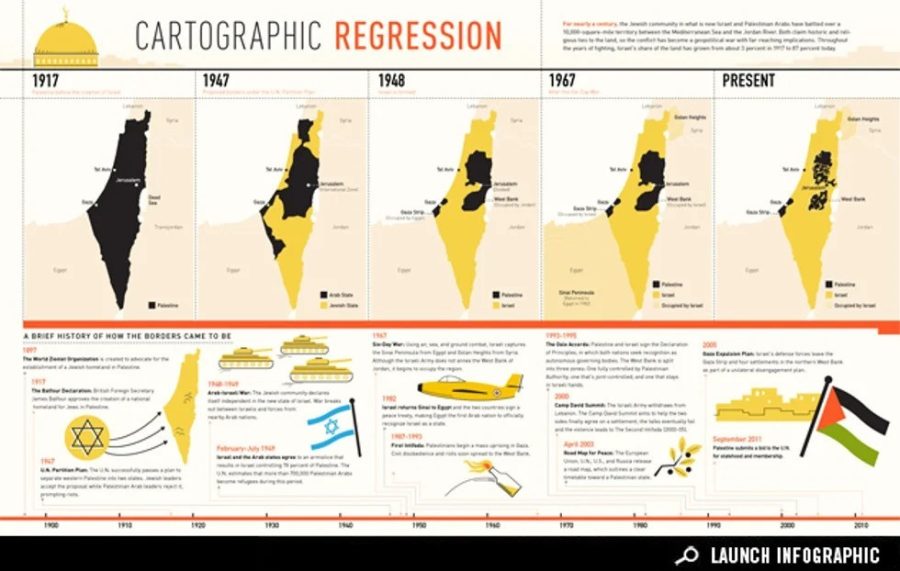Revisiting the Israel-Palestine conflict 20 years on
Since the beginning of the 20th century, Palestinian territory has shrunk.
January 6, 2023
Over 20 years ago, at a time when only 16% of Americans sympathized with Palestinians and their plight against colonial oppression, The Hawk Talk took a stand that many Americans were ostracized and silenced for. Former News Editor Chris Ford wrote one part of the article about the then recent conflict in Israel, taking a pro-Palestine stance with well-written and valid points. Unfortunately for Palestinians across the world and especially in their homeland, Ford’s criticism of Israel’s policies still holds true today.
The shift in rhetoric, public opinion and focus on the Israel-Palestine conflict has shifted dramatically throughout the past 20 years. This shift has seen a massive influx of support for the Free Palestine movement, far more positive media coverage of the Palestinian plight and a surprising amount of American politicians in avid support of the movement including Representatives Ilhan Omar, Rashida Talib and Vermont Senator Bernie Sanders. Despite this support for the people of Palestine, the United States remains Israel’s biggest supporter, sending $3.8 billion to the nation in 2019.
However, this money has not been wasted in the past two decades. Money sent to Israel is used for its Iron Dome, a missile defense system developed by Israeli firms supported by the US. This defense system gives Israelis a sense of security and protection from missile attacks by terrorist groups. These groups, such as Hamas, target and kill innocent civilians and are condemned by both sides of the conflict. Both the Israeli and Free Palestine movements have not wavered in their denouncement of terrorism and the wrongful and vicious killings of innocent civilians.
Just as the pro-Israel movement has not wavered from the rightful denouncement of terrorism, the view of Israel’s right to self defense has also not budged. Israel’s right to self defense is still its right, as is any other nation’s right to self defense. Israel has defended their citizens against numerous attacks from terrorists, saving countless lives. However, those on the Free Palestine side have made the claim that Israel has been abusing their right to self-defense and broad jumping into full-scale bombing of millions of vulnerable people. This was characterized recently by both attacks on Gaza in the past two years. This has not gone unnoticed as Israel has killed over twenty-two times more Palestinians than Israelis killed since 2008.
Through all of the changes brought by the 20-year gap in coverage of this issue by The Hawk Talk, one name has stayed rather consistent throughout the coverage of Israel and Palestine: Benjamin Netanyahu who was recently reelected as Prime Minister of Israel following previous stints in power as PM. Although a consistent figure throughout the past 20 years, an unprecedented change has sparked in his country under him. A shift in Israeli youth towards far-right beliefs has led to a drastic shift in Israeli politics and beliefs. Recently in an interview with CNN, author and professor Yuval Noah Harari explained that a majority of Israelis favor a three tiered class system, in which Israeli Jews are on the top. In a dramatic shift, the decades-old goal of a two-state solution and peace has been seemingly abandoned for what many human rights organizations are calling apartheid.
Since the contentious double edged article published in May 2002, the shift in rhetoric and ideals of both groups have shifted. Within the Israeli side of the article, Editor-in-Chief Daniella Grossman called for peace and the reduction of extremism within Palestinian factions, and on the Palestinian side, Ford called for a change in US policy that aligned itself with protecting human rights. Since then, extremism has existed on both sides as it did before, but a dramatic shift in Israeli support for an apartheid system cannot be ignored. The abandonment of a peaceful two-state solution by Israel should raise alarms, and as Ford wrote 20 years ago, a change in US policy should be in order.



